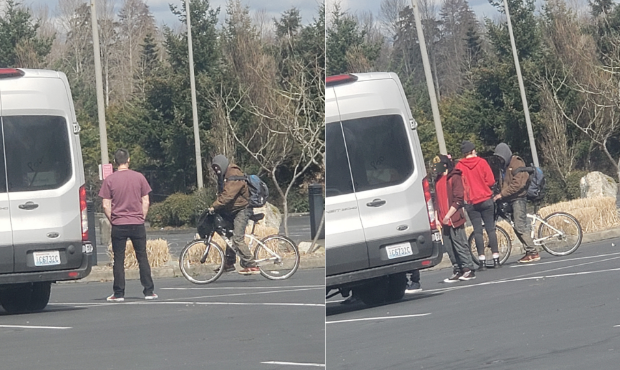Rantz: Seattle Public Health will give needles to minors, community pushes back
Apr 4, 2021, 6:37 PM | Updated: Apr 5, 2021, 5:37 am
Needle exchange programs from Public Health — Seattle & King County hand out needles to any drug addict who asks. That includes minors, no matter their age. They’ll even hand deliver it to them at their home or in a public parking lot.
The Jason Rantz Show on KTTH has learned that county needle exchange programs don’t even have written rules for when staff interact with minors.
A Federal Way woman says she witnessed a teen as young as 16 receive needles from South County Outreach Referral and Exchange (SCORE). He then proceeded to shoot up. Now, thanks to a group of community activists, the spotlight is focused on how SCORE and Public Health operates.
Public Health hands out needles to any who asks
SCORE is a taxpayer-funded needle exchange program. But it does not require any exchange at all.
Staff drive a van to private residences, park and ride lots, and other public locations in King County. There, addicts pick up clean needles to further their drug addiction. SCORE gives anyone who asks the supplies they need to feed their addiction for nearly a month.
“Historically, the program has operated as a one for one exchange but has always made sure that people coming into the exchange without any supplies left have what they need to be safe,” a Seattle & King County Public Health spokesperson tells the Jason Rantz Show on KTTH. “When COVID-19 hit our community, we transitioned to a model that minimizes the time someone needs to be out in public — reducing their risk as well as staff risk of exposure to COVID-19. We work with people to try to get a sense of what they need to stay safe for a two- to three-week period.”
As the SCORE van made more frequent stops in Federal Way — without the city’s consent or knowledge — a group of activists took notice. Ken, who recently called into the Jason Rantz Show on KTTH, was one of them.
Public Health says SCORE visits Federal Way roughly twice a week, though some activists say they’ve seen more frequent visits. Ken and other community activists with a local Facebook group investigated what was going on. Ken says he even followed one of the vans to understand how the program operates.
“I sat there and I took some pictures of people walking up to [SCORE’s van]. It’s like they just all appeared,” Ken told the Jason Rantz Show on KTTH. “I think a bus might have come and dropped them off. One guy came with a bike. I didn’t get to see what they were actually doing. They were getting stuff and they walked away with these bags of stuff, and [SCORE] went to three different locations.”
SCORE-ing needles, teen shoots up in parking lots
In Q1 of this year, Public Health programs handed out an average of 137,910 syringes per month. Many of the recipients are homeless. Since SCORE doesn’t require addicts to return dirty needles, many are littering parks and other areas where the homeless live.
On his drive following SCORE, Ken says he saw addicts “shooting up about 200 yards away in different locations.”
Grace, another local activist, told the Dori Monson Show on KIRO Radio that she connected with SCORE, was able to pick up 100 boxes of needles, but wasn’t offered guidance on how to seek treatment. She says she witnessed a teen she pegged as 16-years-old pick up a supply of needles and get high.
“It was a boy, he went up to the van, got his needles, and then he walked off to the side of the parking lot and then he proceeded to shoot up,” Grace told Dori Monson. “I think if people actually watched something like that in progress, they would think twice about whether this program is actually helping or aiding people in supporting their addiction. And it’s really sad.”
Can SCORE connect with children? Yes
Public Health confirms that “SCORE does not check IDs for syringe supplies nor for other life-saving medications including naloxone.” They also say their needle exchange programs have no written policy around minors of any age.
There have been no reports from SCORE staff of minors making contact with the vans, according to Public Health. Using limited survey data conducted every two years, Public Health reports that 30% of its “needle exchange customers” in the county (not just with SCORE) are between 20-29, 36% between 30-39, 15% between 40-49, and 19% 50+.
But the spokesperson acknowledges, “we do not have a policy that states age requirements for exchange so I can’t say that there hasn’t been, or will not be a situation where a minor exchanges syringes.”
Sans a policy, how should staff react with minors who are very clearly underage? The spokesperson explains:
[S]taff would likely use their experience to ensure that the teen does not feel stigmatized, putting them at higher risk for behaviors that are dangerous including risk of infection and overdose. Importantly, given the increase in fatal overdoses impacting youth, the staff would likely engage the young person in discussions about their use and how to stay safe, including naloxone. For the staff, front of mind would be ensuring the young person knows that there are trusted people and programs available to help. If, in the judgement of the provider, they felt that exchange of syringes might help build trust that would ultimately reduce harmful impacts for that young person and increase likelihood that the teen would return to get support, then yes, the provider may decide that exchanging syringes is the best approach.
While it passes out needles, SCORE does not proactively offer advice on how to treat addiction.
SCORE isn’t pro-active in addiction treatment
Public Health defends this “data-based” approach as a harm reduction model. Many addicts will use needles no matter what. Thus, proponents argue, addicts should at least be given clean needles. It cuts down on diseases like Hepatitis C and HIV.
“There is no evidence to show that syringe exchange programs encourage drug use or cause someone to increase their drug use,” the spokesperson tells me.
I think it’s naïve to claim giving someone a syringe doesn’t encourage or cause someone to increase their drug use. What do they think the addicts are doing with the needles they receive? Are there no addicts who are holding off until they get clean needles?
There’s no doubt that using clean needles is safer than dirty ones. Public Health rightly notes that drug injection is a leading driver of Hep C. But even when using a clean syringe, it is still not safe.
In the first quarter of this year, Public Health confirms 116 people died of a drug overdose in King County. There are 42 more deaths listing drugs as a probable cause of death, but has not yet been confirmed.
The only way to ensure these addicts do not die from an overdose is to get them treatment. Are these programs doing anything like that? Hardly.
Public Health says SCORE “staff are well versed in conversations regarding resources and referrals to treatment.” However, those conversations “are generally client driven.”
Why I think this matters
If clear and convincing data showed this model helped get addicts treatment, it would be reason to reconsider opposition to programs like SCORE. It might be uncomfortable for taxpayers to pay for needle exchange, but if it showed meaningful results, it’s worth a community discussion. We are all better served when addicts are helped.
But without that data, which doesn’t seem to exist, we’re simply enabling an addict’s deadly behavior. It will eventually kill them. And along the way to that inevitable death, they won’t just suffer from the addiction itself.
Many addicts live on the streets precisely because of their addiction. Without treatment, they won’t get on the right path. Addiction to certain drugs can increase the risk of developing schizophrenia, aggression, hallucinations, and paranoia. And living on the streets makes them vulnerable to becoming victims of other addicts or nefarious actors preying on the homeless.
We also shouldn’t ignore the communities these addicts impact. Kids find used needles in playgrounds. Addicts live in dangerous encampments around communities. And to feed their habit, they often commit crimes like theft. No one wins when we enable addiction.
“It’s inhumane,” community activist Ken reminds us.




















